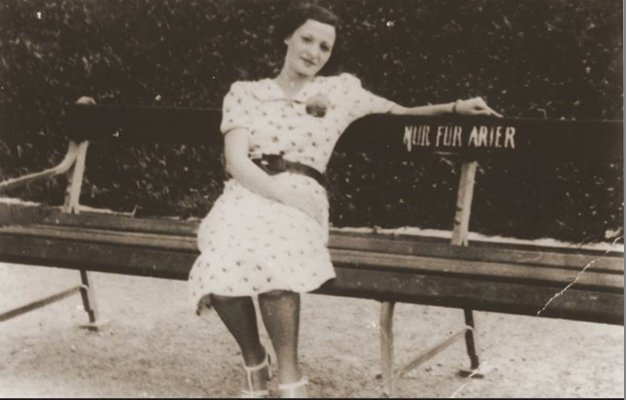click to dowload our latest edition
CLICK HERE TO SUBSCRIBE TO OUR NEWSLETTER


Published
3 years agoon
By
Jordan MosheWhen Berlin resident Hertha Reis was evicted from her home in 1941 because she was Jewish, she had no qualms about denouncing the Nazi regime.
In front of the Berlin courthouse, she exclaimed boldly, “We lost everything. Because of the damned government, we finally lost our home, too. This thug Hitler, the damned government, the damned people. Just because we are Jews, we are discriminated against.”
The narrative that Jews were lead like lambs to the slaughter is being challenged. Contrary to popular belief, thousands of Jews in Nazi Germany resisted the regime.
That’s according to history professor Wolf Gruner, who last week accounted for hundreds of Jewish individuals like Reis who thumbed their noses at Hitler and his followers.
“Defiance and protest are really important because they challenge the popular belief that there was no resistance,” Gruner said in a webinar co-hosted by The Base and the Johannesburg Holocaust & Genocide Centre.
“We often hear people say that the Jews didn’t resist. I broke these stereotypes.”
Indeed, Gruner has spent years uncovering evidence of Jewish resistance to Nazi rule, spanning from the early 1930s well into the 1940s.
“There are even stories of open protest during the war,” said Gruner. “After eight years of Nazi rule, Jews still had the courage to resist. It challenges the widespread belief that there was passive suffering under the Nazis.”
According to Gruner, the perception of passivity has been nourished by the fact that historians typically discuss resistance mostly in terms of organised, group, and armed resistance, neglecting individual acts.
“When one applies this new definition to an analysis of Nazi society, it produces astonishing results of individual opposition,” Gruner said.
His research has revealed many instances of individual resistance. Photographs of Jewish men and women protesting, openly standing in front of anti-Jewish signs, or seated on benches reserved for Aryans aren’t uncommon, suggesting a diverse array of acts which defied Nazi rule.
“Most historians would look at Nazi sources like administrative reports or use diaries and memoirs to find proof,” said Gruner. “Most of these didn’t really mention individual acts of resistance. My research is based on much unexplored material.”
Gruner combed through hundreds of German police logbooks housed in German state archives, uncovering thousands of reports (though brief) which provide evidence of public protests by individual Jews.
“I was struck,” he said. “After 20 years of research, I had never come across this type of protest. I followed up to see what became of these Jews, and found that many were sent to special courts which were usually used to punish Germans for political protest. Dozens of Jews protested and were sentenced.”
This proved true across the Reich, with acts of defiance taking place in Berlin, Leipzig, Vienna, and further afield.
“Against the boycott of Jewish shops, individuals intervened with petitions in the 1930s,” said Gruner. “This lasted well into the 1940s. Records show that immediately after the Nazis came to power, Jews protested in public, criticising the beating of Jews and their torture in the early camps.”
In fact, records reveal that Jews didn’t stop with verbal criticism but resisted in other ways. Throughout the 1930s, many were arrested for besmearing antisemitic newspapers, contesting the Hitler salute, or destroying Nazi flags and posters.
In 1936, for example, David Bornstein tried to destroy the logo of the swastika on a public bus, scratching it with his walking stick. He was jailed for five weeks, and after subsequent interment in a labour camp, fled to British mandate Palestine.
“In Berlin in 1935 there was a wave of anti-Jewish demonstration,” Gruner said. “Against this movement, a flyer was found in German mailboxes written by a Jew.” He wrote, “Germany is a disgrace. I am a Jew who is loyal to the emperor. Germany should expel the foreigner Hitler. Down with Hitler!”
Jews ignored municipal bans on using public spaces and pools, some speaking out and even cursing Hitler in public. Jewish men even got into brawls, taking on storm troopers or their antisemitic neighbours.
Such was the case with Fritz Josephthal, who accosted Julius Streicher, the editor of the infamously discriminatory journal, Der Sturmer, after the publication ran a scathing article about his late father.
Josephthal’s niece, herself a Holocaust survivor, recounted in a video, “Der Sturmer ran an article about my uncle’s father, Dr Josephthal, saying that that bodies of virgins and children were found in his basement and their blood had been used for Pesach.”
Fritz Josephthal had been an officer in World War I, and when he read the story, he donned his uniform, pinned on his medals, and went to Streicher’s office.
“He marched in, pushed past the receptionist, and walked up to Streicher’s desk,” said his niece. “He said, ‘Did you know Dr Josephthal?’ When Streicher said no, my uncle said, ‘then meet his son’, and beat Streicher in the face with his riding crop.” Astonishingly, Streicher never sought a reprisal.
Contesting Nazi propaganda, oral and written protest, defying restrictions, and self-defence against attacks all classify as resistance, said Gruner.
“We can understand for the first time why there is a trope of so-called ‘impudent Jews’ in Gestapo reports. Historians thought they put it in to justify harsher measures, but now we can say it actually refers to real opposition and protest.”
